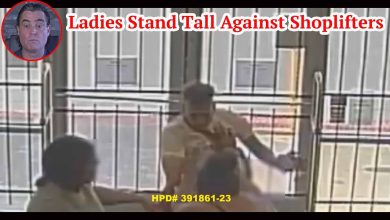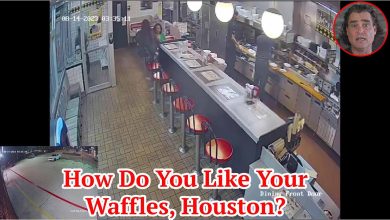Self-Defense: Garage Invasion & Excessive Force


We discuss whether this garage invasion incident was justified self-defense or an example of excessive force.
In a video circulating on social media, a startling scene unfolds as a homeowner faces off against intruders in his own garage. The footage captures the tension of a life-threatening encounter, raising crucial questions about the boundaries of self-defense. The video is available for you to watch at ForgeOfFreedom.com, but I’ll describe it and analyze it here as well because there’s a lot to be learned.
The Situation
The video begins with a man pulling his car into his garage, only to find himself under threat as the garage door begins to close: A hand appears under the garage door just before it closes, halting the door’s descent, and soon three individuals enter the garage. The “leader,” armed with a gun, walks right up to the driver-side door and opens it. The driver of the car, presumably whose house this is, starts shooting—and shoots the guy who just opened the car door (with a gun in his hand).
As soon as the driver starts shooting, as you might expect, the other two guys flee—the two accomplices turn around and are quickly gone. The main perpetrator who opened the door departs after a brief pause: He seems to have been shot three or four times by the number of muzzle flashes seen.
Then, the driver jumps out of his car and chases the fleeing perpetrators as they run out of the garage. The driver continues to shoot as he runs to the edge of his garage, while the perpetrators flee.
So Many Questions
The pivotal question arises: Was the homeowner justified in his use of deadly force for self-defense? The answer is yes … and no.
Examining the sequence of events through the lens of the law provides some clarity amid the chaos.
The initial confrontation, wherein the armed intruder attempts to enter the homeowner’s vehicle, falls squarely within the realm of justifiable self-defense. Clearly, the three men entered the garage with the intent of at least carjacking the driver. We don’t know what else they might have wanted to do.
Maybe it was going to be a home invasion, too. We don’t know.
Indiana law, like many states, permits the use of deadly force to prevent a forcible felony, such as the carjacking of an occupied motor vehicle. By firing upon the armed assailant, the homeowner exercised his right to protect himself.
However, the subsequent shots fired as the fleeing felons exit the garage require closer scrutiny. Some might believe that Castle Doctrine applies here. While the Castle Doctrine affords individuals the right to defend themselves in their dwelling with deadly force without an obligation to retreat, its application to a garage is unclear. You can use reasonable force, including deadly force, if it’s necessary to prevent or terminate an unlawful entry into your dwelling. Let’s assume, for the sake of discussion, that your garage is part of your dwelling. There’s a good chance that courts would say so, especially if it’s an attached garage.
The key word here is “necessary.” Is the use of force necessary to prevent or terminate an unlawful entry when the perpetrators are fleeing? If they’ve turned and ran, is any force necessary to terminate the unlawful entry? No. The attempted carjacking or home invasion is over. They’re running away. You’re not preventing the carjacking if you’re shooting at someone running away, especially once they’ve exited the garage.
So Many Factors
Now, am I saying that all of these guys would get prosecuted? No, not necessarily. A prosecutor might decide they’re simply not going to bring charges. But technically, the shooting while the perpetrators are running away is not justified. Irrespective of the potential application of Castle Doctrine, once the intruders retreat from the premises, the necessity of further force ends. Pursuing and shooting at individuals in flight exceeds the bounds of lawful self-defense.
Each shot fired carries the burden of justification. While rapid succession may be warranted in the heat of the moment, the cessation of the threat mandates an end to lethal force. As the intruders exit the garage and flee, the imminent danger ends, rendering continued gunfire legally questionable. While the initial response aligns with legal principles of self-defense, the subsequent pursuit was not clearly justifiable.
Some may have no qualms with the response, but going too far in the eyes of the law places your future freedom in jeopardy. While the homeowner may avoid charges based on extenuating circumstances, the legality of his actions merits examination. Understanding the nuances of self-defense law empowers individuals to navigate threatening situations with clarity and restraint.
This video serves as a sobering reminder of the complexities inherent in self-defense encounters. By dissecting the legal framework surrounding the incident, we gain insight into the rights and responsibilities of individuals in defending themselves and their property. As discussions surrounding self-defense continue, informed dialogue rooted in legal understanding remains essential.
Editor’s Note: This article originally appeared in the July 2024 issue of Gun Digest the Magazine.
More Knowledge For The Armed Citizen:


Next Step: Get your FREE Printable Target Pack
Enhance your shooting precision with our 62 MOA Targets, perfect for rifles and handguns. Crafted in collaboration with Storm Tactical for accuracy and versatility.
Subscribe to the Gun Digest email newsletter and get your downloadable target pack sent straight to your inbox. Stay updated with the latest firearms info in the industry.







